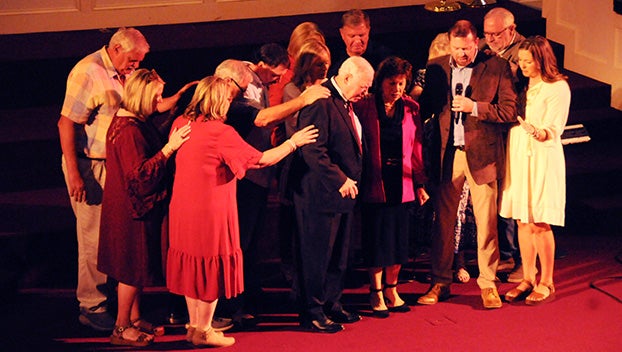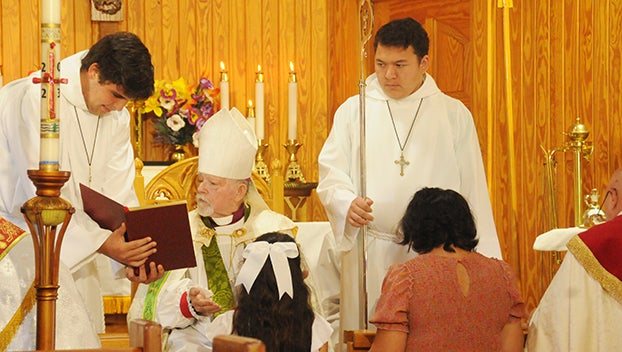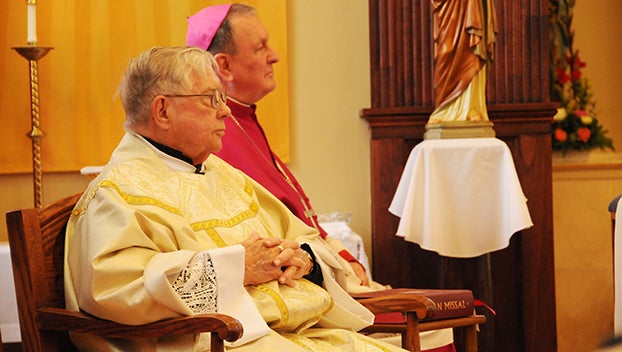Jesus loves all of the little children
Published 10:30 am Monday, November 28, 2011
Every generation of adults has a serious obligation to the world— and that is to raise and train children who will become responsible, loving, caring people. What is to be the adult Christian’s response to children? How do we relate to children in such a way that we help produce responsible adults? How do we relate to children in a way that pleases God? Gospel writer Mark shows us how Jesus related to children—an excellent model for us.
People were bringing little children to Jesus to have him touch them, but the disciples rebuked them. When Jesus saw this, he was indignant. He said to them, “Let the little children come to me, and do not hinder them, for the kingdom of God belongs to such as these. I tell you the truth, anyone who will not receive the kingdom of God like a little child will never enter it.” And he took the children in his arms, put his hands on them and blessed them. (Mark 10:13-16, NIV)
From this warm story, let’s see together four responses that Jesus had toward children. From a culture where children had no status, our Savior elevates children to the highest place. What can we learn from Jesus’ example about relating to children?
First, Jesus “touched” the children. “ People were bringing little children to Jesus to have him touch them…” (Mark 10:13, NIV). It was a practice in that day that when a child turned one year old, he or she was taken to a Rabbi who would touch them and bless them. And “ touch them” is what Jesus did. “ And he took the children in his arms, put his hands on them…” (Mark 10:16, NIV). Statistical data available today proves that children are happier— they are more secure if they are held and touched.
Now surely, the word “touching” has brought something unwholesome to your mind. Maybe you’ve thought, “ This couldn’t happen today. Jesus would be arrested for all that ‘touching.’ Surely with that much ‘touching’ going on someone— some parent would think something was inappropriate and call family services.” You see, just as a wholesome touch of genuine love can encourage and improve and benefit a child, an unwholesome touch can leave lifelong scars on a child.
He touched them. Parents, be affectionate with your children. Touch them. Hug them. And yes, tickling is touching. Older children might not want to hug and cuddle. That’s OK— a pat on the back— a “high five” will do just fine. Children need to know they are loved and that that love is secure— and nothing says it like a touch.
Jesus responded to children in another way. He came to their defense. The disciples thought the children were bothering Jesus and they were trying to prevent them from getting to Jesus. Mark tells us, “ When Jesus saw this, he was indignant. He said to them, ‘Let the little children come to me, and do not hinder them…’” (Mark 10:14, NIV). Here’s Jesus, with the cross not very distant— surely His impending suffering and death is weighing heavily on His mind, and deep into a highly debated teaching— and with a listening audience— yet
He welcomed the interruption of children. There is no doubt from the picture that Mark paints for us, that Jesus stopped what He was doing, and took all the time He wanted to hold, touch, play with and tease these children.
His priorities were in order. In order to do this, He had to come to their defense. Children are in many ways helpless. Children need an advocate. They need a defender. Jesus was such a man. And Jesus is our example.
There are many ways children need defending today. They need defending from abuse. They need defending from a segment of society that would seek to exploit them through pornography and illicit sexual activity. They need defending from any who would want to harm them. The most helpless citizens of our society are the unborn. Christians need to be involved in defending the rights and the lives of the unborn. When children were being wronged by His own disciples, Jesus came to the defense of those who could not defend themselves.
We must do the same if we want to have a say in shaping the future.
Notice another way Jesus responded to these little children. Mark tells us that He “ blessed them.” (Mark 10:16, NIV) We Christians use that word “bless” a lot, don’t we? It’s a good sounding word— it always sounds spiritual. Before we have a meal we say the “blessing.”
When someone sneezes we say, “God bless you.” The hymn writer insists that we “count our blessings.” When things seem to be going our way, we say that we are “blessed.” When we normally think of the word “bless,” we associate it with something God does— in fact, maybe something only God can do. But that’s not the case. “Bless” is something we can do. And we do it a lot— particularly here in the Southern United States.
In the June 2003 issue of Readers’ Digest, there was a little article by Cecilia Rivenspark, entitled, “Southern Charm.” Here’s what she says. A Southerner can get away with the most awful insult, just as long as it is accompanied by the words “Bless her heart” or “Bless his heart.” As in, “If they put his brain on the head of a pin, it’d roll around like a BB on a six-lane high way, bless his heart.” Or, “She’s so bucktoothed, she could eat an apple through a picket fence, bless her heart.”
In the original language, the word means “ to praise, to celebrate, to consecrate to cause to prosper.”
All those are within the realm of human activity— of things we can do. We can even offset some derogatory comment, by throwing a blessing, a “bless his little heart,” in there.
When the little children came to Jesus, “ He took the children in his arms, put his hands on them and blessed them.” (Mark 10:16, NIV)
What was He doing? He was praising them— He was finding good in the and telling them about it. Do children need that today? And He was celebrating their existence. The whole scene painted by Mark is a playful, joyous, happy time. Do children today need to know that adults celebrate their existence? Many parents today view their children as the burden they must bear. No! The Bible says they are a gift. Celebrate! Does that kind of joyous, playful environment benefit children? Surely it does. The overwhelming way we can bless children is by leading them to faith in Jesus Christ. Within the context of eternity, there is no greater blessing.
There’s one final response to children that we see in this passage. We can learn from them. We normally think of children as learners— and surely children do have a lot to learn. But as adults— and especially a Christians we should always be learners— always on the look out for education— and the lesson in our text is that children can be teachers. Children can offer us insight into many areas of life. They see things from a different perspective. Many times their view of things is not biased and hasn’t yet been tainted or altered by the world.
We can watch children and learn. We can listen to children and learn.
But Jesus had a specific lesson in mind. A most important lesson. A child can demonstrate to us— a child can teach us about the kind of faith that is required to “receive” into our lives, the “ kingdom of God.” Jesus said, “ For the kingdom of God belongs to such as these.” He said, “ I tell you the truth, anyone who will not receive the kingdom of God like a little child will never enter it.” (Mark 10:15, NIV) The New Living Translation has, “ Anyone who doesn’t have their kind of faith will never get into the Kingdom of God.” Jesus is saying, “ If you want to learn about saving faith— the kind of faith that gets you into heaven, then observe, and
listen to, and learn from children.” What is it specifically, that children can teach us about faith— about the kind of faith that is required to “ receive the kingdom?”
First, a child’s faith— a child’s trust is a complete trust. It is a trust that doesn’t hold back. Children come into this world trusting— and they have to be taught by others or by experience not to trust. A child will jump off a ladder into a father’s arms— most will do it into a stranger’s arms. A trust with no reservation. Children can teach us that our faith in Christ— must be a complete faith. It need not be a perfect faith— but it must be a complete faith, trusting completely in Jesus Christ alone— nothing more, nothing less.
Secondly, a child is totally dependent on someone else for survival— for life itself. A small child is helpless and must rely on another for the necessities of life. That says a lot about saving faith, doesn’t it? If we want to “ receive the kingdom,” we must forsake all our own attempts to gain it— there is nothing we can do on our own— there’s not even anything we can do to help or contribute to the process.
Salvation— receiving the Kingdom, is all of Jesus— and none of us. We are completely dependent on Him. A child can teach us that.
Jesus placed an extreme value on children. They were a priority with Him. He didn’t mind the interruption of a child. He knew their value. He knew that the future could be shaped by adults who were given good childhoods. So He touched them. He defended them. He blessed them. And He saw a great lesson in observing them.
Those are the same activities we must be involved in, if we as individuals, and as the church of Jesus Christ place the same value on children as did Jesus.
Arnold E. Hendrix, Jr. is the pastor of First Baptist Church Atmore.




